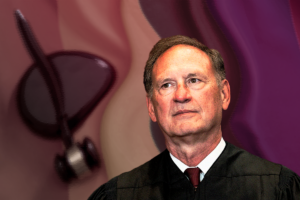Notorious RBG Gets Glitzified in ‘On the Basis of Sex’
Objection! The new biopic is a miscast misstep in honor of Ruth Bader Ginsburg, the popular Supreme Court justice. Felicity Jones does her best to play Supreme Court Justice Ruth Bader Ginsburg, with Armie Hammer as husband Marty Ginsburg, in "On the Basis of Sex," the Hollywood version of Ginsburg's life story. (Focus Features)
Felicity Jones does her best to play Supreme Court Justice Ruth Bader Ginsburg, with Armie Hammer as husband Marty Ginsburg, in "On the Basis of Sex," the Hollywood version of Ginsburg's life story. (Focus Features)
On the 25th anniversary of her swearing in as a Supreme Court justice, Ruth Bader Ginsburg is being feted in not one, but two movies. The first, “RBG,” by Julie Cohen and Betsy West for CNN, is a rare documentary box office hit, earning $14.3 million and winning National Board of Review honors. And opening in theaters Dec. 25 is “On the Basis of Sex,” a conventional and often melodramatic hagiography beginning with the early Harvard Law School years of Ruth and Marty Ginsburg (miscast Felicity Jones and Armie Hammer), leading to her landmark case, Charles E. Moritz v. Commissioner of Internal Revenue, in 1972.
When a young Ginsburg matriculates in 1956, the halls of Harvard Law School are indeed hallowed, if composer Mychael Danna’s French horns and conventional scoring are to be trusted. Dean Griswold (Sam Waterston), a nemesis who will return in act three, invites incoming students to dinner, including, for the first time, nine women. When each is asked why they deem themselves fit to take the seat of a man at the school, Ginsburg judiciously responds that the law is her husband’s endeavor, and by studying it, she hopes to become a more supportive wife.
The moment provides a glimpse of her jujitsu intellect, just part of what has made her so formidable, and much of what is missing in the film. Such authentic moments seem to be the work of a nimbler creative team, clashing with the prosaic dialogue of first-time screenwriter Daniel Stiepleman (Ginsburg’s nephew), and Mimi Leder’s uninspired direction.
While Marty is ill with testicular cancer, Ginsburg works tirelessly and cheerfully, covering his classes and her own while also caring for a newborn. And if you’re not sure how you feel about testicular cancer, Danna’s mordant piano chords on the soundtrack will cue you, just as the rest of his music hints at every emotional beat in the story.
Marty overcomes cancer, and Ginsburg graduates with top honors, but is rejected from every major New York City firm, enduring sexism but also anti-Semitism. By the mid-1960s only six of the top 20 New York law firms were Jewish-run. As it is, anti-Semitism is a point “On the Basis of Sex” brushes up against but never explores, a missed opportunity since Ginsburg later premises many of her arguments on the 14th Amendment, which directly addresses racism by granting citizenship to slaves in the wake of the Civil War.
Judging by past projects and roots in Israel, it’s easy to assume that Natalie Portman, who was originally cast, may have taken a different approach to Ginsburg. Her director on the project, before it fell apart, was the red-hot Marielle Heller, whose critically acclaimed “Can You Ever Forgive Me?” is currently in theaters while she directs Tom Hanks in a new Fred Rogers movie coming in 2019.
Miscast as Jones is, she soundly anchors “On the Basis of Sex,” balancing patience with determination. But the result is a movie version of Ginsburg, one that only occasionally channels a Brooklyn accent and is married to a tall, handsome, blue-eyed rendition of Marty. Together, they look nothing like the real-life Brooklynites they portray, and more like their WASP counterparts from Connecticut.
Ginsburg studied law to practice law, and so she chafes as a professor at Rutgers Law School in Newark, N.J. Marty consoles her with a tax case that might be of interest—Charles E. Moritz v. Commissioner of Internal Revenue, a dispute involving a tax deduction for in-home care for an ailing mother, which Moritz was denied.
Ginsburg takes the case, arguing that the tax code discriminates on the basis of sex, allowing only men who are widowers, or whose wives have been incapacitated or institutionalized, to claim the deduction. To its credit, Stiepleman’s screenplay lays out the legal complexity of the case in clear, easy-to-follow fashion, but the price is paid in expositional scenes that may resonate like arias in the halls of Harvard Law, but not so much in the multiplex.
Defenders of the status quo, including Dean Griswold, base their argument on precedent. To make their point, they add to their brief “Exhibit E,” a list of dozens of laws based on gender. It becomes a roadmap for the ACLU Women’s Rights Project which, in the wake of the decision, earned five victories in six Supreme Court appeals basing arguments on the 14th Amendment.
The three judges of the U.S. Court of Appeals for the 10th Circuit begin by challenging Ginsburg’s logic, only to become bewitched as Leder’s camera lingers on them, capturing inadvertently ludicrous portrait shots of what appear to be troglodytes in black dresses, the obvious link between gender and race-based discrimination dawning on them like an epiphany. The moment is played with the same leaden subtlety of the movie’s themes about the courts reflecting their times.
After working in T.V. in the 1990s, producer/director Leder became one of Hollywood’s rarest creatures, a female director of studio blockbusters. Although “Deep Impact,” an Earth-asteroid collision movie, stood in the box office shadow of “Armageddon’s” bigger blast, it outpaced its predecessor, Leder’s “Peacemaker,” an action thriller starring George Clooney and Nicole Kidman. In the twenty years since, Leder has produced and directed for T.V., notably HBO’s “The Leftovers.”
Working with cinematographer Michael Grady, her camera in “On the Basis of Sex” covers the action instead of telling the story, almost never moving past the superficial expressions on the faces of her actors. It’s not that Felicity Jones (“Rogue One: A Star Wars Story”), can’t act. She received an Oscar nomination for her portrayal of Jane Hawking, wife of Stephen Hawking, in 2014’s “The Theory of Everything.” But casting a green-eyed gamine with cover girl looks partially flies in the face of the type of discrimination Ginsburg herself was fighting in an era when most women were valued mainly for their sex appeal.
Many remember Hammer for his breakthrough, two-handed performance in “The Social Network,” playing opposite himself as the Winklevoss twins, Zuckerberg nemeses and originators of a Facebook prototype. More recently, Hammer appeared in last year’s awards favorite, “Call Me by Your Name,” for which he received a Golden Globe nomination for his charismatic portrayal of an American graduate student in Italy who begins an affair with a teenage boy.
The fact that he’s an accomplished actor with matinee-idol looks might be enough to justify Hammer’s large presence in the movie, when portraits of male icons seldom feature their wives. Most of his time is spent being handsome and supportive, cooking and minding the kids, in addition to his work as a tax lawyer. He is avuncular and kind, intelligent yet humble and well meaning; the perfect match for Jones’ determined, indefatigable and wickedly smart Ginsburg. Such pure motives and scuff-proof souls result in dramatic conflict propelled not by inner struggles, but outer forces only, putting the characters at grave risk of mortal blandness.
Surrounding Jones and Hammer is a strong supporting cast, including Leder’s “The Leftovers” collaborator Justin Theroux, who gives a spirited theatrical performance as Mel Wulf, Ginsburg’s associate at the ACLU. Waterston is sufficiently cocksure as the entitled and shortsighted Dean Griswold, a one-dimensional nemesis. And Kathy Bates has a few memorable scenes as legendary lawyer-activist Dorothy Kenyon, surly and frustrated over the slow progress of social justice at the end of her career. Young Cailee Spaeny delivers a lively and purposeful turn as Ginsburg’s teen daughter, Jane, a budding feminist who cues her mother into the modern movement’s bold, no-nonsense approach.
In the movie’s final frames, Ginsburg herself appears, mounting the top steps outside the Supreme Court. It’s a moment that jogs the audience back to her prodigious real-life achievements, beginning as an activist, an underdog winning case after case in the cause of social justice, and earning a place on the D.C. Court of Appeals in 1980. After transitioning to the Supreme Court in 1993, she continued to chip away at the status quo with cases like the United States v. Virginia, which struck down Virginia Military Institute’s traditional male-only admissions policy in 1996. Today, she’s a pop icon, the most famous Justice since Thurgood Marshall. It’s an epic legal life.
Someone should make a movie. Someone else.
Your support matters…Independent journalism is under threat and overshadowed by heavily funded mainstream media.
You can help level the playing field. Become a member.
Your tax-deductible contribution keeps us digging beneath the headlines to give you thought-provoking, investigative reporting and analysis that unearths what's really happening- without compromise.
Give today to support our courageous, independent journalists.






You need to be a supporter to comment.
There are currently no responses to this article.
Be the first to respond.